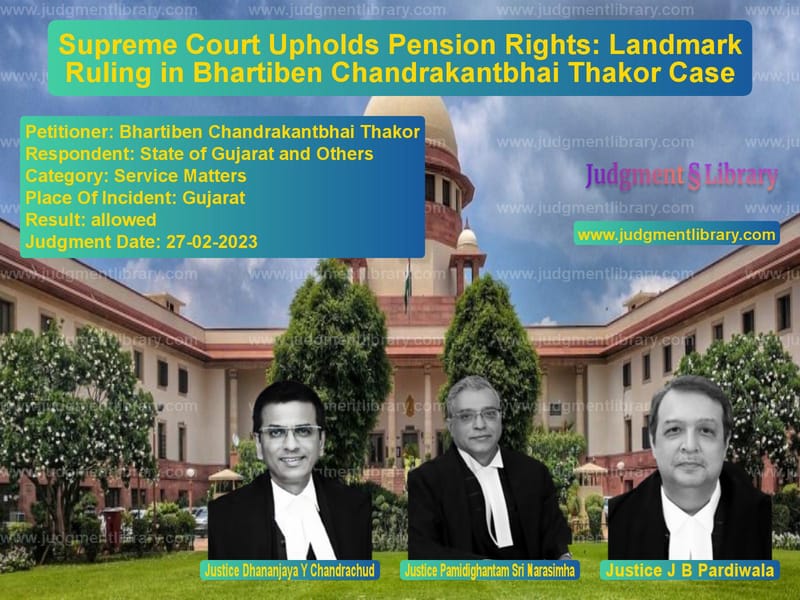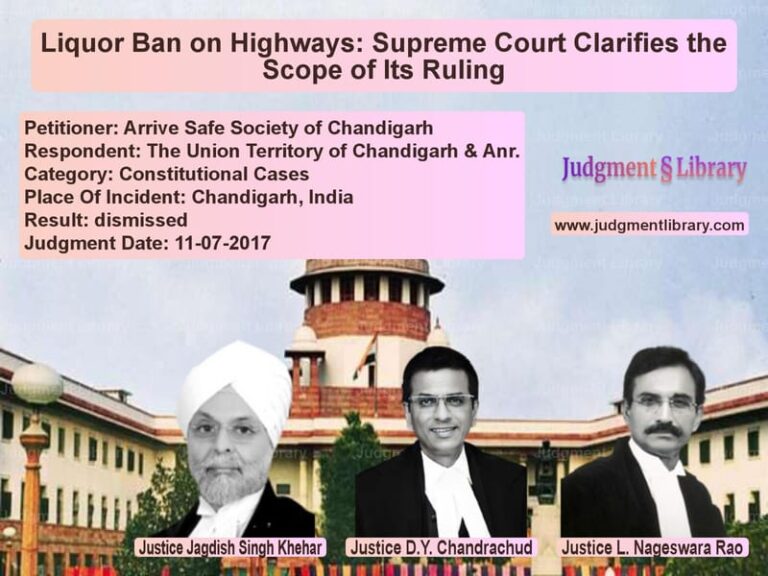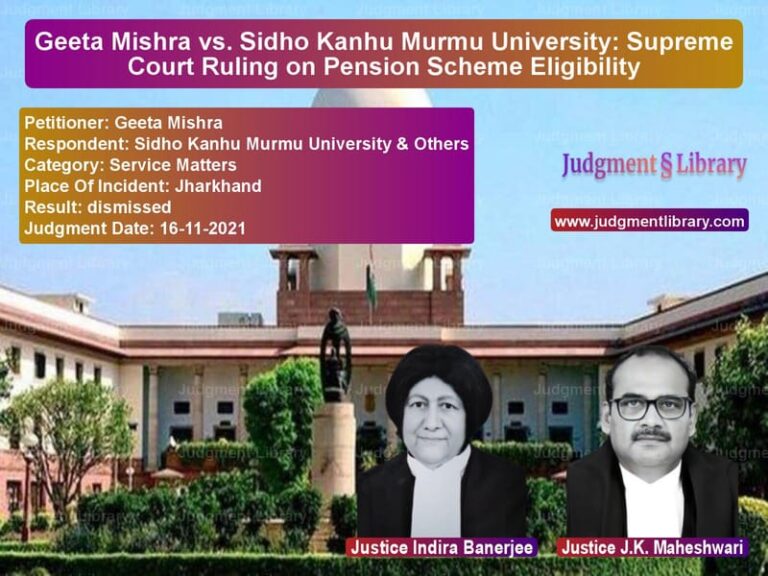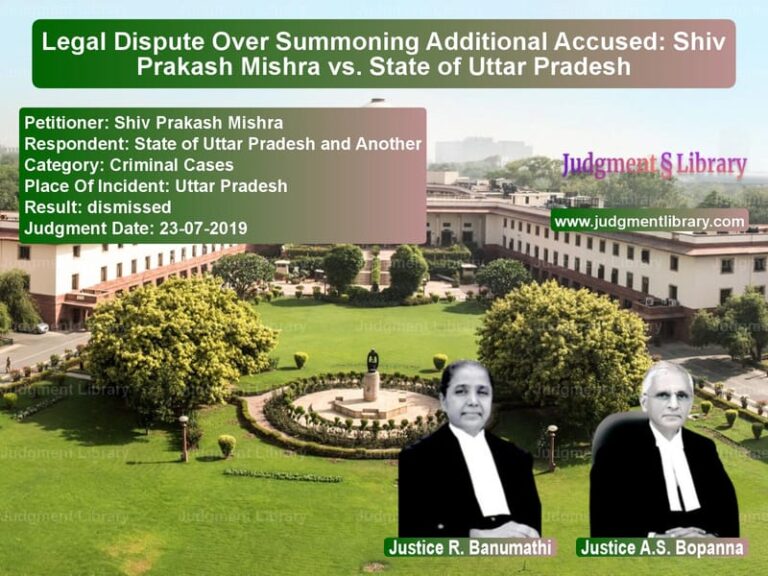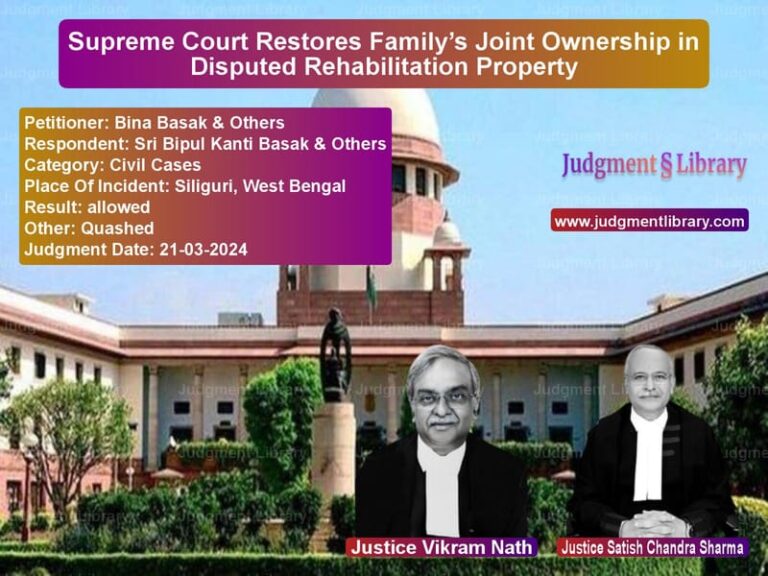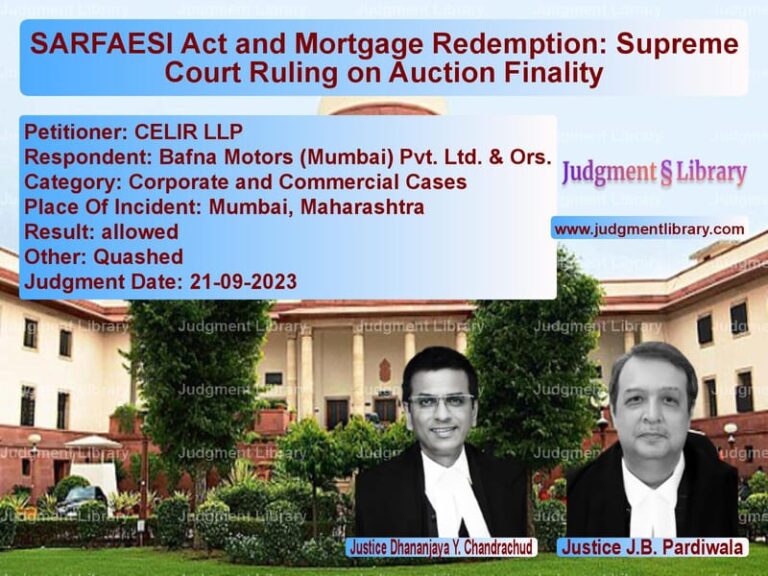Supreme Court Upholds Pension Rights: Landmark Ruling in Bhartiben Chandrakantbhai Thakor Case
The Supreme Court of India recently delivered a significant ruling in the case of Bhartiben Chandrakantbhai Thakor vs. State of Gujarat, addressing crucial legal questions concerning resignation withdrawal, service continuity, and pension eligibility. The case highlights the struggles of a government employee seeking justice after multiple adverse administrative orders affecting her pensionary benefits.
Background of the Case
Bhartiben Chandrakantbhai Thakor was appointed as an Auxiliary Nurse Midwife by the District Panchayat, Valsad, on January 15, 1980. Over a decade later, she submitted her resignation on April 18, 1993. However, before it was formally accepted, she withdrew her resignation on November 23, 1993. Instead of recognizing this withdrawal, the authorities proceeded to accept her resignation retrospectively from March 31, 1993, through an order dated December 23/26, 1994.
First Round of Litigation: High Court Intervention
Feeling aggrieved, the appellant challenged this decision by filing a writ petition under Article 226 of the Constitution. The Single Judge of the Gujarat High Court ruled in her favor on October 12, 2000, setting aside the resignation acceptance order and directing that she be granted all consequential benefits.
However, the State of Gujarat challenged this ruling through a Letters Patent Appeal. The Division Bench upheld the decision but modified it, ruling that while the resignation withdrawal was valid, the appellant would not be entitled to benefits for the period between April 18, 1993, and November 23, 1993.
Continued Administrative Hurdles
Despite the finality of the High Court’s decision, the respondents continued to issue adverse administrative orders affecting the appellant’s benefits:
- On April 8, 2002, and July 17, 2002, authorities treated the period between November 24, 1993, and March 30, 2001, as unauthorized leave.
- The appellant challenged these orders, and on August 9, 2004, the High Court quashed them, directing payment of all benefits for the disputed period with 9% interest.
- Ignoring the previous judicial directives, the respondents issued yet another order on July 16, 2005, treating multiple service periods as unauthorized leave.
Legal Issues Considered by the Supreme Court
The case reached the Supreme Court after successive rounds of litigation. The key legal issues before the Court were:
- Whether the State could continue to issue fresh orders affecting service continuity despite previous High Court rulings.
- Whether the appellant was entitled to pension benefits considering the adverse orders passed by the respondents.
- Whether the State had improperly treated legitimate service periods as unauthorized leave, thus affecting pension calculations.
Supreme Court’s Observations
The Supreme Court analyzed the sequence of events and previous judicial decisions. The Court noted:
“The appellant was subjected to unnecessary administrative hurdles despite clear judicial pronouncements in her favor. The respondents’ actions in passing successive orders affecting service continuity and pension eligibility were legally unsustainable.”
On the issue of resignation withdrawal, the Court reaffirmed that:
“The expression ‘for the period for which resignation was in force’ cannot be stretched beyond November 23, 1993, as the appellant had withdrawn her resignation before its acceptance.”
Further, the Court held that repeated adverse administrative orders could not override the finality of High Court rulings. It was improper for the State to pass fresh orders treating various service periods as unauthorized leave, especially when the appellant had already obtained favorable rulings.
Final Judgment and Directions
The Supreme Court ruled that the appellant had completed the minimum pensionable service of 25 years. It directed:
- The appellant shall be treated as having completed 25 years of pensionable service.
- All pensionary benefits shall be calculated on this basis, regardless of prior orders by the State government.
- Arrears of pension shall be paid within two months.
- Interest at 6% per annum shall be paid on delayed pension payments.
The Supreme Court set aside the Gujarat High Court’s judgment, ensuring that the appellant received her rightful pension benefits.
Significance of the Ruling
This judgment serves as a strong precedent affirming the rights of government employees against arbitrary administrative actions. It reiterates that:
- Once a resignation is withdrawn before acceptance, it ceases to have any legal effect.
- Final judicial decisions must be respected, and authorities cannot issue fresh orders to circumvent them.
- Government employees are entitled to fair treatment, particularly concerning pensionary benefits.
The ruling strengthens employee protections and ensures that pension rights are not unfairly denied through bureaucratic maneuvers.
Petitioner Name: Bhartiben Chandrakantbhai Thakor.Respondent Name: State of Gujarat and Others.Judgment By: Justice Dhananjaya Y Chandrachud, Justice Pamidighantam Sri Narasimha, Justice J B Pardiwala.Place Of Incident: Gujarat.Judgment Date: 27-02-2023.
Don’t miss out on the full details! Download the complete judgment in PDF format below and gain valuable insights instantly!
Download Judgment: bhartiben-chandrakan-vs-state-of-gujarat-and-supreme-court-of-india-judgment-dated-27-02-2023.pdf
Directly Download Judgment: Directly download this Judgment
See all petitions in Employment Disputes
See all petitions in Pension and Gratuity
See all petitions in Termination Cases
See all petitions in Judgment by Dhananjaya Y Chandrachud
See all petitions in Judgment by P.S. Narasimha
See all petitions in Judgment by J.B. Pardiwala
See all petitions in allowed
See all petitions in supreme court of India judgments February 2023
See all petitions in 2023 judgments
See all posts in Service Matters Category
See all allowed petitions in Service Matters Category
See all Dismissed petitions in Service Matters Category
See all partially allowed petitions in Service Matters Category

